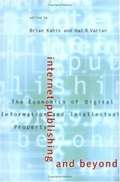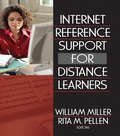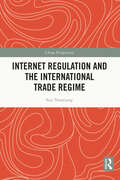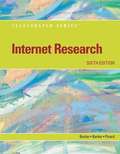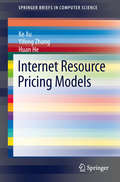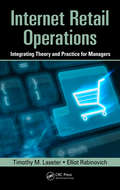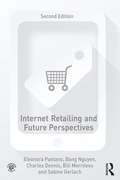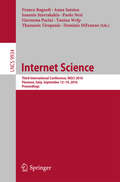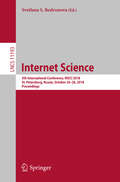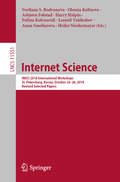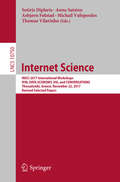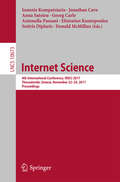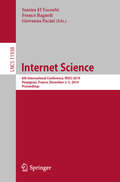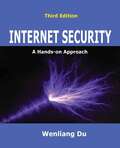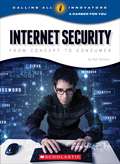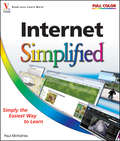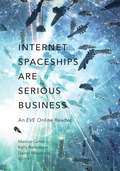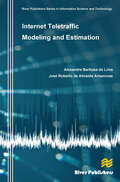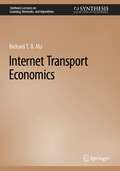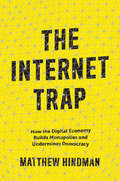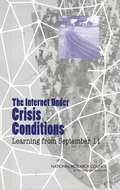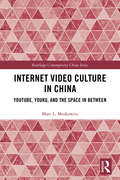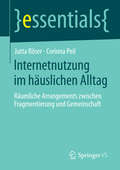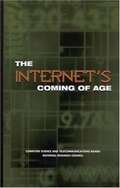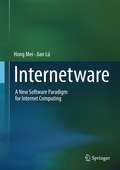- Table View
- List View
Internet Publishing and Beyond: The Economics of Digital Information and Intellectual Property
by Brian Kahin Hal R. VarianThe rapid growth of the Internet and the World Wide Web is transforming the way information is accessed and used. New models for distributing, sharing, linking, and marketing information are appearing. This volume examines emerging economic and business models for global publishing and information access, as well as the attendant transformation of international information markets, institutions, and businesses. It provides those in the public, private, and nonprofit sectors with a practical framework for dealing with the new information markets. Topics addressed include the effects of various technological factors and market environments on pricing; the relationship among classic production costs, transaction costs, and the economic value of intellectual property; the effects of different pricing practices for telecommunications and Internet services on the pricing of information; the bundling and unbundling of information services; changing cost structures and the allocation of rights among authors, publishers, and other intermediaries; the effects of markets for complementary products and services, including advertising, on the pricing and use of information; and policy implications of different pricing models. A Publication of the Harvard Information Infrastructure Project in Collaboration with the School of Information Management and Systems at the University of California at Berkeley.
Internet Reference Support for Distance Learners
by William Miller Rita PellenMake separate library services for distance learners a thing of the past Internet Reference Support for Distance Learners takes a comprehensive look at efforts by librarians and information specialists to provide distance learners with effective services that match those already available on campus. With the development of the World Wide Web and the evolution of Web-based services, reference librarians are adding a human element to the virtual library, blurring the difference between distance learners and traditional users. This unique book examines how they deal with a wide range of related topics, including standards and guidelines, copyright issues, streaming media, and chat and digital references, and presents a historical overview of how reference and instructional services have been delivered to distance users-before and after the creation of the Internet.Internet Reference Support for Distance Learners reveals that librarians do not make a sharp distinction between reference and instruction within the context of distance learning, and that there is no clear boundary between "true" distance learners and more traditional students who might use services designed for nontraditional users. Online capabilities have allowed reference librarians to approximate services advocated by published guidelines and standards, including the ACRL Distance Learning Section&’s Guidelines for Distance Learning Library Services, to provide a framework for librarians to plan services for off-campus students.Internet Reference Support for Distance Learners provides practical information on: how librarians can "keep IT simple" when designing methods to access reference support why library Web sites are vital sources of communication between the distance learning student and the reference-based instructional component how to set up a university chat service, including software selection, staff training and assessment how to provide students services beyond traditional provision of resources, including advising, enrollment, and payment of fees how to create an online assistance site that incorporates online versions of traditional print handouts, FAQs, subject guides, course-specific guides, learning modules, and instructional videos in one central location how to work with faculty to create online support for students in Blackboard courses the pros and cons of using open-source software how to create an online library assistance site how to create online information literacy course to teach independent research skills to remote students how to avoid copyright infringement and how to educate library personnel about copyright law how to use Camtasia Studio, a screen capture program to create audio and video for online presentationsInternet Reference Support for Distance Learners is an invaluable resource for librarians working in academic, school, special, and public settings, and for library science faculty and students.
Internet Regulation and the International Trade Regime (China Perspectives)
by Sun NanxiangIn the age of information, an open Internet is a key component for modern economic development. This book analyses the World Trade Organization Agreement for virtual society and explores key questions regarding internet regulation and trade barriers. Information and communication technology has introduced a transformational element to international trade, in the shape of E-commerce. Although internet technology is conceptually neutral, it can be used as a medium that poses severe threats to individual rights, public morals, public order, and national security. World Trade Organization law and jurisprudence, which are the basis of global economic and trade rules, can be applied in the cyberspace but internet regulatory measures can also pose a threat to free trade. This book thus explores the following questions: whether internet regulation constitutes a trade barrier; if so, what form does that take; and whether WTO members can invoke exception clauses to justify their internet regulatory measures? The research provides deep interpretations on treaty law, case law, and draws on additional interdisciplinary approaches to answer these questions. This book will be of great interest to students and scholars of law, with a focus on International trade and internet regulation, as well as anyone interested in China’s Cyber law.
Internet Research (Sixth Edition)
by Katherine Pinard Donald Barker Melissa BarkerThis book is an ideal learning tool for a wide range of learners. It provides essential information about Internet research, including topics on search toolbars, intelligent search agents, and finding, evaluating and citing online sources.
Internet Resource Pricing Models
by Huan He Yifeng Zhong Ke XuThis brief guides the reader through three basic Internet resource pricing models using an Internet cost analysis. Addressing the evolution of service types, it presents several corresponding mechanisms which can ensure pricing implementation and resource allocation. The authors discuss utility optimization of network pricing methods in economics and underline two classes of pricing methods including system optimization and entities' strategic optimization. The brief closes with two examples of the newly proposed pricing strategy helping to solve the profit distribution problem brought by P2P free-riding and improve the pricing efficiency with the introduction of the price discrimination. The Internet resource pricing strategy is not only the key factor of Internet resource allocation efficiency, but also the determinant of the profit. The methods and models discussed in Internet Resource Pricing Models increase the efficiency of existing pricing strategies to ensure a sound and sustainable development of the Internet. The brief will help researchers and professionals working with this key factor of Internet resource allocation.
Internet Retail Operations: Integrating Theory and Practice for Managers (Supply Chain Integration Modeling, Optimization and Application)
by Timothy M. Laseter Elliot RabinovichThe rise of the Internet as the first choice for retail shoppers presents new challenges for retailers and suppliers. This book details how information technology evolved to play such a role in retail supply chain networks, how this has impacted supply chain networks, and how this has changed service operations. The first part of the text addresses information technology in relation to service and retail industries. The second part covers how the new supply chain dynamics impacts traditional service and retail delivery, the costs involved, the impacts on customer service, and customer expectations. The third part presents case studies of how different retailers meet challenges.
Internet Retailing and Future Perspectives
by Eleonora Pantano Bang Nguyen Charles Dennis Sabine GerlachSince the first edition of this landmark textbook, online shopping has grown exponentially to the point that it now threatens to eclipse the high street. With online retail offering both advantages and challenges that are distinct from traditional commerce, this textbook provides new approaches to retailing and as such helps readers to take advantage of new digital technologies. This long-awaited new edition provides a thorough and substantial update to its solid core principle of digital retailing and its relationship with conventional retail methods. These principles are explained clearly and practically to provide students, entrepreneurs and researchers with a reliable guide to the implementation and operation of a successful online retailing business. Updates to this edition include: Search engine marketing and search engine optimization. New and updated case studies, including Tesco’s virtual store, Ray-Ban’s smart mirror, IKEA’s mobile catalogue and Nordstrom’s TextStyle. Social networks and electronic word-of-mouth communication. A new chapter on ubiquitous retailing. A brand new companion website to support tutors. With accessibly written features such as key learning points, questions, think points and further reading, Internet Retailing and Future Perspectives is ideal for anyone using, studying or researching digital commerce.
Internet Science
by Franco Bagnoli Anna Satsiou Ioannis Stavrakakis Paolo Nesi Giovanna Pacini Yanina Welp Thanassis Tiropanis Dominic DifranzoThisstate-of-the-artsurveyoftechnologies, algorithms, models, andexperiments in the area of Internet Quality of Service is the ?nal report of COST (European Cooperation in the ?eld of Scienti?c and Technical Research) Action 263, Qu- ity of future Internet Services, http: //www. fokus. fraunhofer. de/cost263 (QofIS). COST 263 ran from January 1999 until October 2003 with the participation of some 70 researchers from 38 organizations from 14 European countries (France, Hungary, Italy, Sweden, UK, Belgium, Germany, the Netherlands, Portugal, Slovenia, Switzerland, Finland, Greece, Romania, and Spain). The Action - longed to the COST area "Multimedia and Internet Communication"; together with COST 264, Networked Group Communication, this Action continued the e?ort started in 1992 by COST 237, Multimedia Telecommunications Services. Both groups have combined their e?orts now in the Network of Excellence in Emerging Networking Experiments and Technologies, http: //www. ist-e-next. net (E-NEXT) of the 6th European Framework program. The book consists of seven chapters that were written in 18 months by 67 individual authors. The main objective of this book is to report the state of the art in the area of QofIS, as percieved by the authors, including achievements that wereoriginatedby the authors. The book wasdesigned in a top-downm- ner: after three years of running the Action with close co-ordination of research e?orts, it was easy to achieve a consensus on the table of contents. To ensure the content quality the following roles were de?ned and assigned to COST 263 members: chapter editor, chapter author, chapter reader.
Internet Science: 5th International Conference, INSCI 2018, St. Petersburg, Russia, October 24–26, 2018, Proceedings (Lecture Notes in Computer Science #11193)
by Svetlana S. BodrunovaThis book constitutes the proceedings of the 5th International Conference on Internet Science held in St. Petersburg, Russia, in October 2018. The 23 papers presented were carefully reviewed and selected for inclusion in this volume. They were organized in topical sections named: risks on the Internet: detecting harmful content and discussing regulation; methodologies for studies of online audiences; and online media and public issues.
Internet Science: INSCI 2018 International Workshops, St. Petersburg, Russia, October 24–26, 2018, Revised Selected Papers (Lecture Notes in Computer Science #11551)
by Svetlana S. Bodrunova Olessia Koltsova Asbjørn Følstad Harry Halpin Polina Kolozaridi Leonid Yuldashev Anna Smoliarova Heiko NiedermayerThis book constitutes the refereed post-conference proceedings of 4 workshops, held at the 5th International Conference on Internet Science, St. Petersburg, Russia, in October 2018: Workshop 1 : Detecting Social Problems in Online Content, Workshop 2: CONVERSATIONS, Workshop 3: The Future of Decentralized Governance: A Workshop on Encryption,Blockchains, and Personal Data, and Workshop 4: Internet as an issue: An international workshop on governmentand media narratives. The 20 full papers presented together with 4 short papers were carefully reviewed and selected from 38 submissions. The contributions of the Workshop 1: Detecting Social Problems in Online Content has united Russian scholars who work upon Russian-language datasets. Workshop 2: CONVERSATIONS: An international workshop on chatbot research and design regularly discusses the novel issues in their research and production area. Workshop 3: The Future of Decentralized Governance: A Workshop on Encryption, Blockchains, and Personal Data. At this workshop scholars and industry representatives from France, the Netherlands, the UK, and Russia have discussed distributed governance technologies based on blockchain and other privacy-protecting technologies. Workshop 4: Internet as an issue: An international workshop on government and media narratives took a rare approach and regarded Internet as a focus for public discussion.
Internet Science: Third International Conference, Insci 2016, Florence, Italy, September 12-14, 2016, Proceedings (Lecture Notes in Computer Science #9934)
by Sotiris Diplaris Anna Satsiou Asbjørn Følstad Michail Vafopoulos Thomas VilarinhoThis book constitutes the refereed post-conference proceedings of 4 workshops, held at the 4th International Conference on Internet Science, Thessaloniki, Greece, in November 2017: the Second International Workshop on the Internet for Financial Collective Awareness and Intelligence, IFIN 2017, the International Workshop on Data Economy 2017, the International Workshop on Digital Technology to Support Social Innovation, DSI 2017, and the International Workshop on Chatbot Research and Design, CONVERSATIONS 2017. The 17 full papers presented together with one short paper were carefully reviewed and selected from 27 submissions. The contributions of the IFIN workshop focus on a multidisciplinary dialogue on how to use the internet to promote financial awareness and capability among citizens whereas the papers of the Data Economy workshop show how online data change economy and business. The aim of the DSI workshop was to collect the lessons learned from different platforms and settings, and to understand the requirements and challenges for building and using digital platforms to effectively engage broad participation in the social innovation process. The papers of the Conversations workshop explore the brave new world of human-computer communication through natural language, gathering latest developments in chatbots research and design.
Internet Science: 4th International Conference, INSCI 2017, Thessaloniki, Greece, November 22-24, 2017, Proceedings (Lecture Notes in Computer Science #10673)
by Ioannis Kompatsiaris, Jonathan Cave, Anna Satsiou, Georg Carle, Antonella Passani, Efstratios Kontopoulos, Sotiris Diplaris and Donald McMillanThis book constitutes the proceedings of the 4th International Conference on Internet Science held in Thessaloniki, Greece, in November 2017. The 34 papers presented were carefully reviewed and selected for inclusion in this volume. They were organized in topical sections named: next generation community engagement; online policy, politics and co-creation; understanding and empowering digital citizens; data-driven research and design; social media and online interaction.
Internet Science: 6th International Conference, INSCI 2019, Perpignan, France, December 2–5, 2019, Proceedings (Lecture Notes in Computer Science #11938)
by Samira El Yacoubi Franco Bagnoli Giovanna PaciniThis book constitutes the proceedings of the 6th International Conference on Internet Science held in Perpignan, France, in December 2019. The 30 revised full papers presented were carefully reviewed and selected from 45 submissions. The papers detail a multidisciplinary understanding of the development of the Internet as a societal and technological artefact which increasingly evolves with human societies.
Internet Security: A Hands-on Approach
by Wenliang DuTeaching Internet security principles via hands-on activities. <p><p>Unique among computer security texts, this book, in its third edition, builds on the author’s long tradition of teaching complex subjects through a hands-on approach. For each security principle, the book uses a series of hands-on activities to help explain the principle. Readers can touch, play with, and experiment with the principle, instead of just reading about it. The hands-on activities are based on the author's widely adopted SEED Labs, which have been used by over 1000 institutes worldwide. The author has also published online courses on Udemy based on this book.
Internet Security: From Concept to Consumer (Calling All Innovators: A Career for You)
by Nel YomtovLearn about the history of internet security and find out what it takes to make it in this exciting career field.
Internet Simplified
by Paul McfedriesThe content boom on the Internet has been explosive in the past few years with more than a billion people surfing worldwide. Internet Simplified shows beginning level computer users how to get comfortable surfing the web and how to navigate the flood of information once they find what they're looking for. Users will find helpful information on the most talked about newcomers to the online world such as social networking sites like Facebook and MySpace, blogging, and downloading media content from YouTube and iTunes, as well as an introduction to the old standbys such as email, auction sites, and instruction for safe surfing. Coverage on how to safeguard against viruses and SPAM and keep computers free from unwanted visitors is approached in a gentle, user-friendly manner so anyone can apply the techniques and be free from troublesome intrusions. Full-color screen shots and numbered, step-by-step instructions guide readers through the intricacies of navigating the web in a friendly, approachable way. The updated design features a more sophisticated look and larger fonts and images to make this a perfect reference for all ages.
Internet Spaceships Are Serious Business: An EVE Online Reader
by Marcus Carter Kelly Bergstrom Darryl WoodfordEVE Online is a socially complex, science-fiction-themed universe simulation and massively multiplayer online game (MMOG) first released in 2003. Notorious for its colossal battles and ruthless player culture, it has hundreds of thousands of players today. In this fascinating book, scholars, players, and EVE's developer (CCP Games) examine the intricate world of EVEOnline--providing authentic accounts of lived experience within a game with more than a decade of history and millions of "real" dollars behind it.Internet Spaceships Are Serious Business features contributions from outstanding EVE Online players, such as The Mittani, an infamous member of the game's community, as well as academics from around the globe. They cover a wide range of subjects: the game's technicalities and its difficulty; its projection of humanity's future in space; the configuration of its unique, single-server game world; the global nature of warfare in its "nullsec" territory (and how EVE players have formed a global concept of time); stereotypes of Russian players; espionage play; in-game memorials to Vile Rat (aka U.S. State Department official Sean Smith, murdered in the 2012 Benghazi attack); its gendered playing experience; and CCP Games' relationship with players; and its history and legacy.Internet Spaceships Are Serious Business is a must for EVE Online players interested in a broad perspective on their all-consuming game. It is also accessible to scholars, game designers seeking to understand and replicate the successful aspects unique to EVE Online, and even those who have never played this notoriously complex game.Contributors: William Sims Bainbridge, National Science Foundation; Chribba; Jedrzej Czarnota; Kjartan Pierre Emilsson; Dan Erdman; Rebecca Fraimow; Martin R. Gibbs, U of Melbourne; Catherine Goodfellow; Kathryn Gronsbell; Keith Harrison; Kristin MacDonough; Mantou (Zhang Yuzhou); Oskar Milik; The Mittani (Alexander Gianturco); Joji Mori; Richard Page; Christopher Paul, Seattle U; Erica Titkemeyer, U of North Carolina at Chapel Hill; Nick Webber, Birmingham City U.
Internet Teletraffic Modeling and Estimation (River Publishers Series In Information Science And Technology Ser.)
by Alexandre Barbosa de Lima Jose Roberto AmazonasNetwork traffic has fractal properties such as impulsiveness, selfsimilarity, and long-range dependence over several time scales, from milliseconds to minutes. These features have motivated the development of new traffic models and traffic control algorithms. This book presents a new statespace model for Internet traffic, which is based on a finite-dimensional representation of the Autoregressive Fractionally Integrated Moving Average (ARFIMA) random process. The modeling via Autoregressive (AR) processes is also investigated.
Internet Transport Economics (Synthesis Lectures on Learning, Networks, and Algorithms)
by Richard T. MaThis book presents Internet transport economics as a new approach to understanding the packet-switching paradigm of Internet infrastructure as a global transport system for data packets. It is a prescient view of the Internet’s evolution into a content-centric service platform where the quality of services (QoS) cannot be guaranteed due to the tens of thousands of autonomous systems that enact business decisions on peering, routing, and pricing in a way that determines aspects of the Internet ecosystem like network topology, latency and throughput of traffic flows, and performance of network applications. The trafficking issues created in this environment are a critical concern and barrier for user applications that require real-time responses, such as telesurgery and teleoperation of autonomous vehicles, and the book presents the Internet transport economics model as the solution. While engineering and business are the prevailing lenses through which the Internet is viewed, the book builds its methodological framework around transport. Further delving into economics, it establishes how the Internet can be understood as providing transport services for data packets, whose demand and supply are driven by the QoS metrics of delay and loss, which can be regarded as congestion costs that result in equilibrium rates of traffic flows sent by content providers (CPs). The book goes on to present a stylized model of content provider-to-access provider (CP–AP) service as well as congestion equilibrium and rate equilibrium solution concepts under the Internet transport economics framework. These are used to analyze the problem domains of service differentiation, market structure, and data pricing. Finally, it discusses various potential future applications. This book will be of interest to graduate students and researchers in areas of computer networking and performance evaluation.
The Internet Trap: How the Digital Economy Builds Monopolies and Undermines Democracy
by Matthew HindmanA book that challenges everything you thought you knew about the online economy <P><P>The internet was supposed to fragment audiences and make media monopolies impossible. Instead, behemoths like Google and Facebook now dominate the time we spend online—and grab all the profits from the attention economy. <P><P>The Internet Trap explains how this happened. This provocative and timely book sheds light on the stunning rise of the digital giants and the online struggles of nearly everyone else—and reveals what small players can do to survive in a game that is rigged against them. <P><P>Matthew Hindman shows how seemingly tiny advantages in attracting users can snowball over time. The internet has not reduced the cost of reaching audiences—it has merely shifted who pays and how. Challenging some of the most enduring myths of digital life, Hindman explains why the internet is not the postindustrial technology that has been sold to the public, how it has become mathematically impossible for grad students in a garage to beat Google, and why net neutrality alone is no guarantee of an open internet. <P><P>He also explains why the challenges for local digital news outlets and other small players are worse than they appear and demonstrates what it really takes to grow a digital audience and stay alive in today’s online economy. <P><P>The Internet Trap shows why, even on the internet, there is still no such thing as a free audience.
The Internet Under Crisis Conditions: Learning from September 11
by Committee on the Internet Under Crisis Conditions: Learning from September 11This report presents findings of a workshop featuring representatives of Internet Service Providers and others with access to data and insights about how the Internet performed on and immediately after the September 11 attacks. People who design and operate networks were asked to share data and their own preliminary analyses among participants in a closed workshop. They and networking researchers evaluated these inputs to synthesize lessons learned and derive suggestions for improvements in technology, procedures, and, as appropriate, policy.
Internet Video Culture in China: YouTube, Youku, and the Space in Between (Routledge Contemporary China Series)
by Marc L MoskowitzExamining Internet culture in the People’s Republic of China, Taiwan, Hong Kong, and the US, this book analyzes videos which entertain both English and Chinese-speaking viewers to gain a better understanding of cultural similarities and differences. Each of the chapters in the volume studies streaming videos from YouTube and its Chinese counterparts, Todou and Youku, with the book using a combination of interpretative analysis of content, commentary, and ethnographic interviews. Employing a diverse range of examples, from Michael Jackson musical mash-ups of Cultural Revolution visuals, to short clips of Hitler ranting about twenty-first century issues with Chinese subtitles, this book goes on to explore the ways in which traditional beliefs regarding gender, romance, religion, and politics intersect. Looking at how these issues have changed over the years in response to new technologies and political economies, it also demonstrates how they engage in regional, transnational, and global dialogues. Comparing and incorporating the production of videos with traditional media, such as television and cinema, Internet Video Culture in China will be useful to students and scholars of Internet and digital anthropology, as well as Cultural Studies and Chinese Studies more generally.
Internetnutzung im häuslichen Alltag: Räumliche Arrangements zwischen Fragmentierung und Gemeinschaft (essentials)
by Jutta Röser Corinna PeilDer Beitrag präsentiert aktuelle Befunde zur Internetnutzung im häuslichen Alltag. Die Autorinnen nehmen zunächst eine Systematisierung alltagsbezogener Rezeptionsforschung der Cultural Studies vor und führen den Domestizierungsansatz ein. Auf Basis ethnografisch orientierter Haushaltsstudien wird anschließend aufgezeigt, auf welche Weise Internetnutzung, räumliche Arrangements und häusliche Kommunikationsstrukturen miteinander interagieren. Abschließend werden verschiedene Arrangements beschrieben und deren Einflüsse auf die Herstellung von Gemeinschaft und Fragmentierung, auf geschlechtsgebundene Praktiken sowie auf Funktionen anderer Medien, insbesondere des Fernsehens, skizziert.
The Internet's Coming Of Age
by Compature Science Telecommunications Board National Research CouncilWhat most of us know as "the Internet" is actually a set of largely autonomous, loosely coordinated communication networks. As the influence of the Internet continues to grow, understanding its real nature is imperative to acting on a wide range of policy issues.This timely new book explains basic design choices that underlie the Internet's success, identifies key trends in the evolution of the Internet, evaluates current and prospective technical, operational, and management challenges, and explores the resulting implications for decision makers. The committee-composed of distinguished leaders from both the corporate and academic community-makes recommendations aimed at policy makers, industry, and researchers, going on to discuss a variety of issues: How the Internet's constituent parts are interlinked, and how economic and technical factors make maintaining the Internet's seamless appearance complicated. How the Internet faces scaling challenges as it grows to meet the demands of users in the future. Tensions inherent between open innovation on the Internet and the ability of innovators to capture the commercial value of their breakthroughs. Regulatory issues posed by the Internet's entry into other sectors, such as telephony.
Internetware
by Hong Mei Jian LüThis book presents a comprehensive introduction to Internetware, covering aspects ranging from the fundamental principles and engineering methodologies to operational platforms, quality measurements and assurance and future directions. It also includes guidelines and numerous representative real-world case studies that serve as an invaluable reference resource for software engineers involved in the development of Internetware applications. Providing a detailed analysis of current trends in modern software engineering in the Internet, it offers an essential blueprint and an important contribution to the research on software engineering and systems for future Internet computing.
